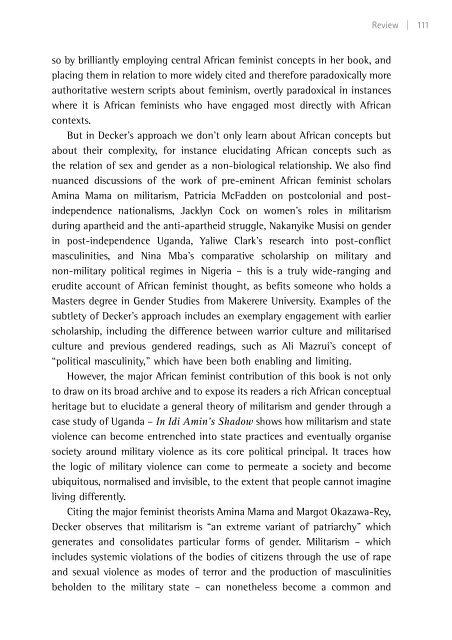Create successful ePaper yourself
Turn your PDF publications into a flip-book with our unique Google optimized e-Paper software.
so by brilliantly employing central African feminist concepts in her book, <strong>and</strong><br />
placing them in relation to more widely cited <strong>and</strong> therefore paradoxically more<br />
authoritative western scripts about feminism, overtly paradoxical in instances<br />
where it is African feminists who have engaged most directly with African<br />
contexts.<br />
But in Decker’s approach we don’t only learn about African concepts but<br />
about their complexity, for instance elucidating African concepts such as<br />
the relation of sex <strong>and</strong> gender as a non-biological relationship. We also find<br />
nuanced discussions of the work of pre-eminent African feminist scholars<br />
Amina Mama on militarism, Patricia McFadden on postcolonial <strong>and</strong> postindependence<br />
nationalisms, Jacklyn Cock on women’s roles in militarism<br />
during apartheid <strong>and</strong> the anti-apartheid struggle, Nakanyike Musisi on gender<br />
in post-independence Ug<strong>and</strong>a, Yaliwe Clark’s research into post-conflict<br />
masculinities, <strong>and</strong> Nina Mba’s comparative scholarship on military <strong>and</strong><br />
non-military political regimes in Nigeria – this is a truly wide-ranging <strong>and</strong><br />
erudite account of African feminist thought, as befits someone who holds a<br />
Masters degree in Gender Studies from Makerere University. Examples of the<br />
subtlety of Decker’s approach includes an exemplary engagement with earlier<br />
scholarship, including the difference between warrior culture <strong>and</strong> militarised<br />
culture <strong>and</strong> previous gendered readings, such as Ali Mazrui’s concept of<br />
“political masculinity,” which have been both enabling <strong>and</strong> limiting.<br />
However, the major African feminist contribution of this book is not only<br />
to draw on its broad archive <strong>and</strong> to expose its readers a rich African conceptual<br />
heritage but to elucidate a general theory of militarism <strong>and</strong> gender through a<br />
case study of Ug<strong>and</strong>a – In Idi Amin’s Shadow shows how militarism <strong>and</strong> state<br />
violence can become entrenched into state practices <strong>and</strong> eventually organise<br />
society around military violence as its core political principal. It traces how<br />
the logic of military violence can come to permeate a society <strong>and</strong> become<br />
ubiquitous, normalised <strong>and</strong> invisible, to the extent that people cannot imagine<br />
living differently.<br />
Citing the major feminist theorists Amina Mama <strong>and</strong> Margot Okazawa-Rey,<br />
Decker observes that militarism is “an extreme variant of patriarchy” which<br />
generates <strong>and</strong> consolidates particular forms of gender. Militarism – which<br />
includes systemic violations of the bodies of citizens through the use of rape<br />
<strong>and</strong> sexual violence as modes of terror <strong>and</strong> the production of masculinities<br />
beholden to the military state – can nonetheless become a common <strong>and</strong><br />
Review | 111


